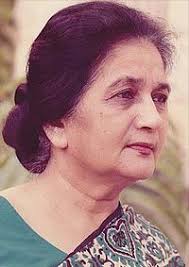Ada Jafarey [often spelt Ada Jafri (22 August 1924 – 12 March 2015),was born in Badayun, U.P. Her birth name was Aziz Jahan. She was a Pakistani poet who is regarded as the first major Urdu poet who published as a woman and had been called "The First Lady of Urdu Poetry". She was also an author and was considered a prominent figure in contemporary Urdu literature. She had received awards from Pakistan Writers' Guild, the Government of Pakistan and literary societies of North America and Europe in recognition of her efforts. Ada Jafarey was part of a traditionally conservative society where women were not allowed to think and express independently. But she was bold enough to express herself. Despite having traditionality ingrained in her personality, she took part in modern art. As early as 1950, she was recognized as the First Lady of Urdu Poetry. Her mother, and her husband Nurul Hasan Jafarey, encouraged her to keep on her literary activities in spite of social difficulties. She was the student of great poets like Akhtar Sheerani and Jafar Ali Khan Asar Lakhnavi and used to get her poetry checked and corrected by them.[ Style Ada Jafarey writes in a gender-neutral mode, though her works include feminist themes like discrimination and dehumanisation of women and of them being viewed as sexual objects. Her personality seems absent from her poetry. Ada Jafarey wrote of her experiences as a wife and mother in a modified traditional idiom, but also noticed the lack of fulfillment that accompanied these relationships. Genre Ada Jafarey's works are mostly Ghazals, but she also experimented with āzād naz̤m, as well as Urdu Haiku. She had mastered both genres of Urdu poetry, naz̤m and ghazal. In her ghazals, she took the pen name, ‘Adā’. She has also written a few maẓāmīn.[ Works Ada Jafarey's first ghazal was published in Akhtar She erani's magazine, Romān, in 1945. Ada Jafarey published her first collection of poems, “Maiṉ Sāz Ḍhūṉḍtī Rahī” in 1950. Her book, ‘G̲h̲azal Numā’, containing short essays with short biographies and brief commentaries on the work previous Urdu poets was published in 1987. Besides, she published five collections of Urdu poetry (‘S̲h̲ahr-i Dard’, ‘G̲h̲azālāṉ, Tum to Wāqif Ho!’, ‘Ḥarf-i S̲h̲anāsāʾī’, ‘Safar Bāqī’, and ‘Mausam, Mausam’), in addition to her autobiography (“Jo Rahī so BeK̲h̲abrī Rahī”), and forty research papers.She also published her collection of Urdu Haiku, Sāz-i Suk̲h̲n Bahānā hai. Her ghazal, Hoṉṭoṉ pih kabhī un ke merā nām hī was sung and popularised by Ustad Amanat Ali Khan.The first couplet of that ghazal is: Awards In 1955, Hamdard Foundation, New Delhi recognized her as the "Outstanding Female Poet of the Century". Later, she was awarded the Adamjee Literary Award by the Pakistan Writers' Guild in 1967 for her second poetic collection, S̲h̲ahr-i Dard. In recognition of her work, the Government of Pakistan awarded her the Medal of Excellence in 1981. She received the Baba-e Urdu, Dr. Maulvi Abdul Haq Award from the Pakistan Academy of Letters in 1994, and the Quaid-e Azam Literary Award in 1997. She was also the recipient of the Hamdard Foundation of Pakistan's Certificate of Merit. She was the recipient of various international awards from literary societies in North America and Europe. The Government of Pakistan conferred upon her the Pride of Performance Award for Literature in 2003 (awards were announced on 14 August 2002). She was the recipient of the Kamal-e Fan Award for lifetime achievement in literature by the Pakistan Academy of Letters in 2003. She was the first woman recipient of the award since the literary prize was established by the Pakistan Academy of Letters (PAL) in 1997.
NaN
